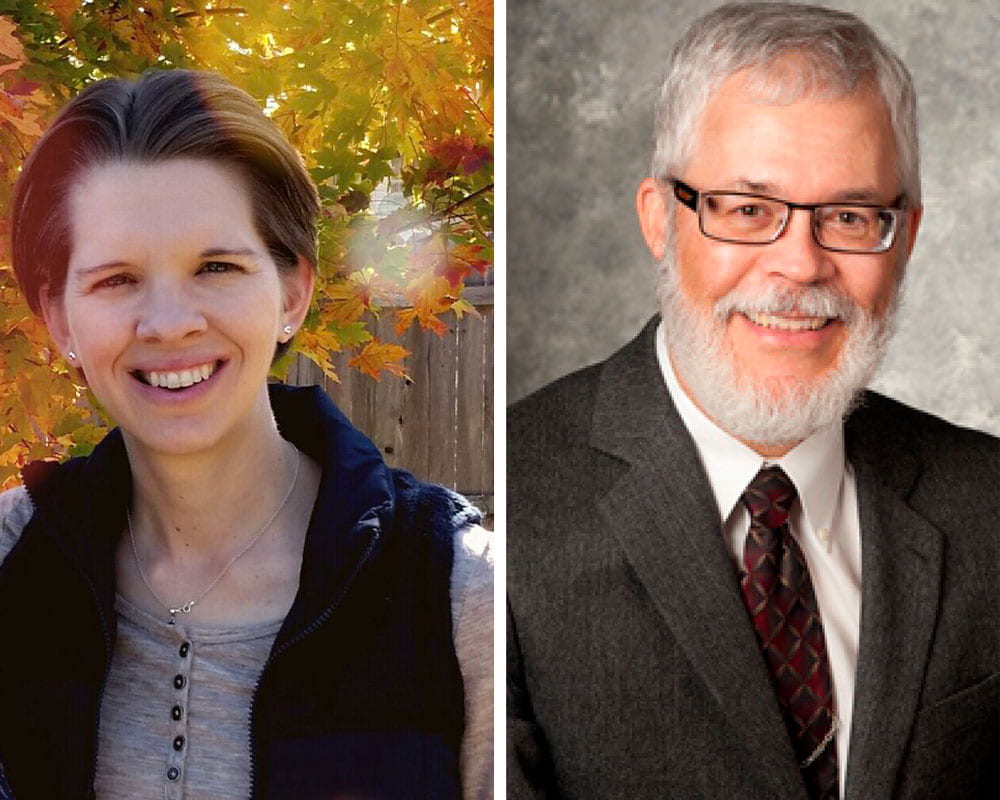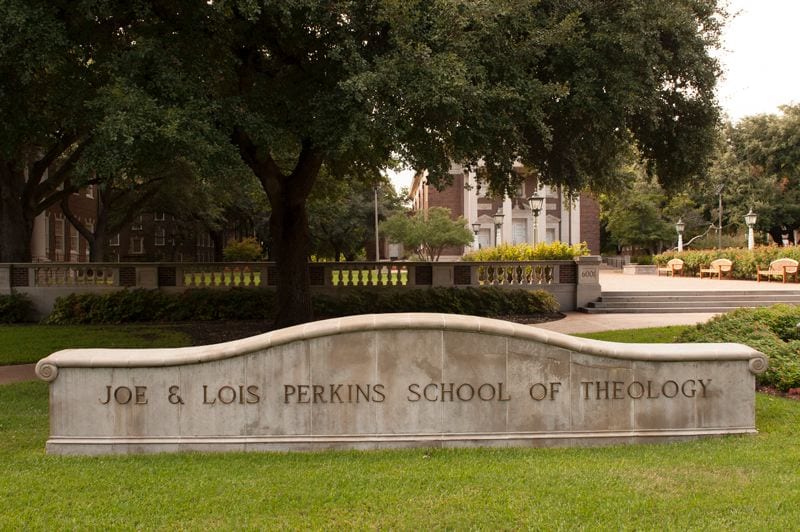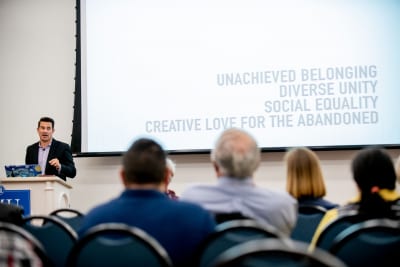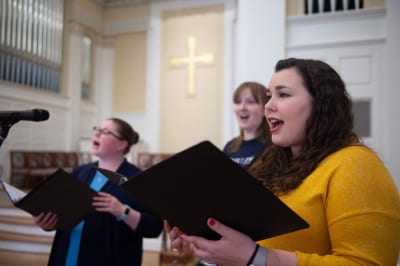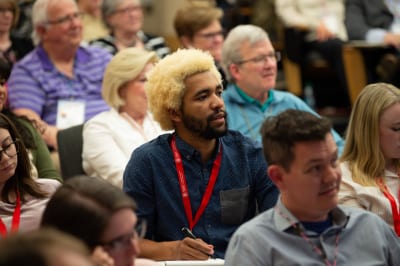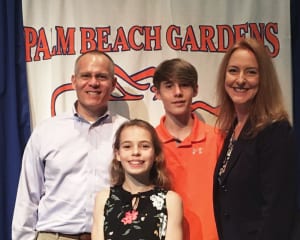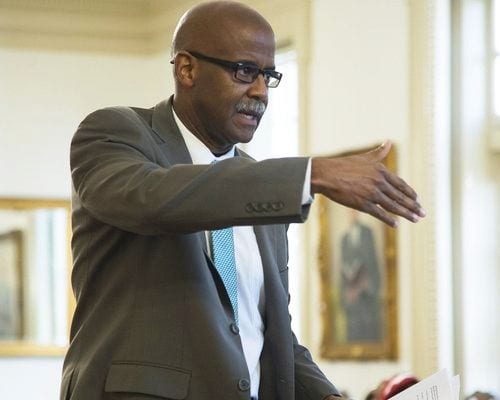Since its founding, Perkins School of Theology has prepared students for the pulpit. Now, a new program is helping Perkins students to prepare to speak through alternative “pulpits” – books, blogs, film, music and other media.
The Minister-Author-Scholar-Teacher (MAST) Program, launched as a pilot venture in the fall of 2018, is a two-year program that offers resources and training to a select cohort of master’s level students at Perkins interested in writing or creating other media for the church and academy.
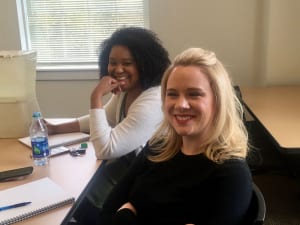 The inaugural “class” drew students with interests in film, music, blogging and Sunday School curriculum, as well as more academic writing, according to Ted A. Campbell, a Perkins faculty member and director of the MAST program.
The inaugural “class” drew students with interests in film, music, blogging and Sunday School curriculum, as well as more academic writing, according to Ted A. Campbell, a Perkins faculty member and director of the MAST program.
“Most are students who want to be pastors but are also interested in creating material for a popular audience – the laypeople in the church,” he said. “They tend to be younger students who are media savvy and tech savvy. It’s a really interesting group.”
The group gathers for four events per semester. In the second year, students will participate in a capstone course, with the goal of creating and submitting a publishable work, such as a book, to a publisher or media outlet. The program has garnered endorsements from prominent authors, including the Rev. Adam Hamilton, Bishop Robert Schnase, Dr. Amy Oden and the Rev. Dr. Michael Waters. (See endorsements after article.)
February’s class featured Rachel Ridge, a popular author who writes about faith for a lay audience. Her most recent book, Walking with Henry: Big Lessons from a Little Donkey on Faith, Friendship, and Finding Your Path, was published in March 2019 by Tyndale. Ridge shared her story about how, at a point when her family was struggling, they adopted a homeless donkey. That adventure led to her first book and the launch of her writing career.
After hearing Ridge speak, MAST participant Emily Clark (M.A.M., 2020) was inspired to begin posting daily on her blog, Our Beautiful, Messy Lives.
“I love to write; the MAST program is helping me to follow that interest and really develop it,” she said. “It’s wonderful to have a group of like-minded people – I call it a community of creative creators. They are a source of motivation and momentum.”
Campbell says the project is giving students practical pointers on marketing and disseminating their work, such as guidance on submitting a book proposal.
“One of the first questions an author must answer is ‘Who will read your book?’” Campbell said. “And the wrong answer is, ‘Everybody.’ It’s challenging but it’s essential for an author to define his or her readership. It’s helping students with this interest to think in this way.”
“I immediately jumped at the chance for training and networking with other people who were interested in doing creative, well-researched Christian work made for a wide audience of people,” said Adam Lubbers, an M.Div. student in the MAST program. “I am currently a youth director and I teach every week, primarily with lessons I write. I preach sermons to a congregation sometimes, and I enjoy watching TV shows, movies, and playing video games, and thinking about all of them theologically.”
Lubbers added that he’s interested in using popular culture to make complex theological themes accessible to a wider audience.
“Popular culture is something I utilize often whenever I teach teenagers and give sermons, and my future creative work will probably focus on this,” he said.
Future events will include gatherings with speakers like Adam Hamilton, a United Methodist pastor and bestselling author; an SMU novelist who writes from a secular perspective; and the Rev. Arthur Jones, a pastor at St. Andrew United Methodist Church in Plano, Texas, who expresses key sermon themes across a variety of media – podcasts, blogs, video and more – in a coordinated approach.
Future events will include speakers like the Rev. Arthur Jones, a pastor at St. Andrew United Methodist in Plano, Texas, who expresses key sermon themes across a variety of media — podcasts, blogs, video and more — in a coordinated approach; and an SMU novelist who writes from a secular perspective. The Rev. Adam Hamilton, a United Methodist pastor and bestselling author, spoke to the MAST students while on campus on March 28.
“I’m not aware of other theological schools undertaking such a program,” said Dean Craig C. Hill, who helped spearhead the MAST program. “This is part of our vision of Perkins as ‘an academy for the whole church in the whole world.’ We need to encourage and educate the next generation of pastor/scholars who will produce books, film, and other media that are accessible to a popular audience but also theologically informed.”
In recent decades, it has been primarily more conservative churches that have been innovative in producing materials accessible to a wide audience, such as the wildly popular Left Behind fiction series. But these don’t necessarily reflect mainstream Christian scholarship. The Left Behind books, for example, are based on a very specific interpretation of apocalyptic biblical literature that has its origins in the 19th century. Campbell and Hill hope the MAST program will help to launch a new wave of similarly accessible materials that are grounded in the teachings of the historic mainline Protestant churches.
“Dean Hill has been thinking a long time about the need for Christian leaders to engage popular readership and viewership,” said Campbell. “The MAST program is a significant step in that direction.”
Application Information
A second cohort of students will begin the MAST program in the fall of 2019. Anyone interested should contact Ted A. Campbell at tedc@smu.edu.
Students who wish to be considered for the program should be accepted simultaneously into a Perkins master’s degree program and must have a 3.5 cumulative GPA (or equivalent) from their undergraduate degree-granting institution. In addition, they should submit two additional items for review to the Director of the Program: a formal letter of interest explaining the student’s sense of vocation as relates to the production of writing and/or other genres of creative media, and a sample of their creative work (writing or other media) for review. Participants will be selected by the director of the program in consultation with the MAST program advisory group.
Endorsements
These four Perkins alumni, all accomplished authors and pastors, weighed in with their words of endorsement for the new program.
“Perkins’ new MAST program is a gift to pastors who feel called to write and teach, and to authors, scholars and teachers who are called to preach. Study, shepherding, teaching, preaching and writing are all important elements of my ministry. Each strengthens the others. I am a better pastor because I write, and I am a better writer because I am a pastor. Perkins’ new MAST program is the only program I know aimed at equipping students for this important integrated ministry. If you feel called to write, to teach and to preach, you must take a serious look at this program.”
– The Rev. Adam Hamilton, bestselling author and senior pastor of Church of the Resurrection in Leawood, Kansas.
“As we re-imagine church for the 21st century, the MAST program looks like an exciting move in the right direction, cultivating artists, prophets and poets who enter into the culture creatively, inviting new conversations in new places. We live so much of our lives in virtual villages of one sort or another, it’s critical to offer good news in these gathering spaces through podcasts, videos, blogs and new media.”
– Dr. Amy Oden, professor of early church history and spirituality at St. Paul School of Theology at Oklahoma City University and author of God’s Welcome: Hospitality for a Gospel-Hungry World.
“I began to intentionally cultivate the craft of writing while I was a seminary student at Perkins. Writing is a contemplative experience for me and has become a cornerstone of my ministry. It’s my way of learning, of engaging in deep conversation, and of offering myself to the church. I’m delighted to recommend the MAST program to those seeking to multiply their ministry by cultivating their capacity for creative writing and teaching. MAST provides the community of support, encouragement, and accountability that fosters creativity and courage.”
– Bishop Robert Schnase, writer, pastor, and bishop of the Rio Texas Annual Conference.
“Our world has long benefited from prodigious prophets who have used their pen to propel people to pursue new plateaus for faithful service to God and God’s creation. I am grateful for the intentionality of the MAST program to help raise up a new generation of prodigious prophets who will use their pens and cursors to do the same.”
-The Rev. Dr. Michael W. Waters, author and founding pastor of Joy Tabernacle African Methodist Episcopal (A.M.E.) Church in Dallas, Texas.
